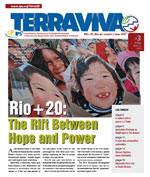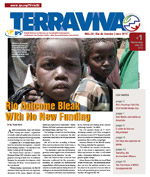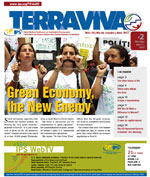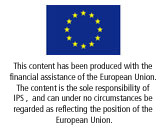By Thalif Deen
UNITED NATIONS, Jun 12 (IPS/TerraViva) – When world leaders endorse the final plan of action, titled “The Future We Want, at the Rio+20 summit in Brazil next week, a lingering question may remain unanswered: how best can the United Nations transform political platitudes into economic realities?
As the 193-member Preparatory Committee (PrepCom) continues its final round of negotiations through Friday in Rio de Janeiro this week – and perhaps beyond, if the current deadlock continues – there are several proposals already on the table for institutional reform or the creation of new bodies.

U.N. chief Ban Ki-moon has called for a show of "political courage" to seize the "once-in-a-generation" opportunity presented by Rio+20. Credit: UN Photo/JC McIlwaine
These proposals include strengthening of the existing U.N. Environment Programme (UNEP) by upgrading it to a full-fledged U.N. agency; establishing a Global Economic Coordination Council; creating a Global Sustainable Development Council and the granddaddy of all, the establishment of a mega World Environment Organisation (WEO).
The WEO, a longstanding proposal which has been kicked around the U.N. system for over two decades, was resurrected last week by French President Francois Hollande.
He said a WEO, “like the World Trade Organisation (WTO) or the International Labour Organisation (ILO),” would contribute to the success of Rio+20.
The President of the General Assembly Nassir Abdulaziz al-Nasser said Rio+20 summit needs to produce “a strong institutional architecture”.
“This architecture must promote a better integration of the three dimensions of sustainable development: economic, social and environment protection,” he said.
He said it must also address new and emerging issues, review the sustainability of progress achieved, and monitor the implementation of the commitment.
Last week, Secretary-General Ban Ki-moon also reiterated the “need for a new institutional framework to support our shared sustainable development goals (SDGs) – an effective body that can track their progress”.
This body, he said, should have both high-level political engagement, and space for civil society, local authorities and the private sector to contribute their knowledge and expertise.
The United Nations has already begun to organise for the post-2015 challenge and opportunity, which that will closely follow the targeted date, 2015, for the achievement of the Millennium Development Goals (MDGs) and the beginning of SDGs.
“I have asked the heads of the U.N. Development Group and the Executive Committee on Economic and Social Affairs to mobilise the entire U.N. system behind this effort,” Ban added.
For starters, he announced last week the creation of a new post of assistant secretary general to oversee the post-2015 implementation of SDGs: Amina J. Mohammed of Nigeria will be Ban’s special adviser on post-2015 development planning.
An adjunct professor at Columbia University, New York, she has also served as the senior apecial assistant to the president of Nigeria on the MDGs.
Ban also announced a High-Level Panel of Eminent Persons to advise on a post-2015 way forward: President Susilo Bambang Yudhoyono of Indonesia, President Ellen Johnson Sirleaf of Liberia, and British Prime Minister David Cameron, with further appointments to follow.
In his detailed proposals for a sustainable global society, Daisaku Ikeda President of the Tokyo-based Soka Gakkai International has called for the establishment of a new international organisation through the merger of U.N. agencies in the fields of the environment and development.
“We need to develop the institutional capacity to implement comprehensive responses that prioritise the actual and expressed needs of people and build the foundation for lives of dignity,” he said.
At present, he pointed out, both the U.N. Development Programme and UNEP are structured so that only those states that are members of the respective governing councils can have a final say in decisions.
“In light of the importance of sustainable development and the wide range of issues and sectors involved, we must ensure that all states that wish to may participate in full,” Ikeda added.







 Add to Google
Add to Google







